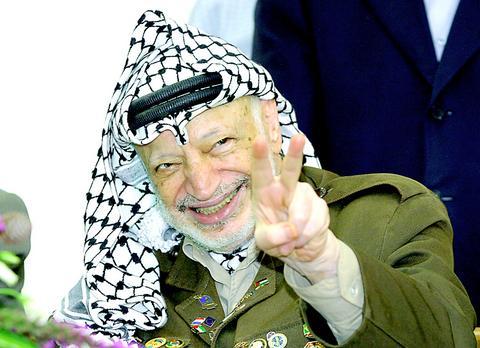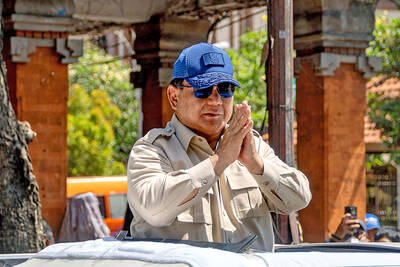Palestinian President Yasser Arafat has spent months staving off pressure to surrender some of his power, particularly control over the Palestinian security forces, to those who might make better use of it.
The Americans, Israelis, Egyptians and British have attempted to cajole Arafat into retreating to the position of figurehead leader, a role they can tolerate because he remains the Palestinians' core symbol of their struggle for a country.
Arafat occasionally gave ground, but then often subverted the change. He rid himself of one troublesome Palestinian prime minister, blocked reform of the security forces and undercut attempts by his finance minister, much vaunted in the West, to ensure that the Palestinian Authority's (PA) billions were accounted for.

PHOTO: AFP
But Arafat now faces a potentially much tougher challenge to his overarching control -- from the Palestinian people themselves.
Bitterness, fear and desperation have bubbled to the surface in the Gaza Strip, producing what some Palestinian commentators are describing as a mutiny that challenges Arafat's web of control, if not his position as leader.
Several days of chaos have been marked by kidnappings, open threats to some in the Palestinian leadership for their corruption and mass protests against Arafat's appointment of a relative and close political allies to sensitive security posts in the Gaza Strip.
Palestinian Prime Minister Ah-med Qureia sent Arafat a letter of resignation and issued a warning.
Arafat declined to accept the resignation letter, drawing a large cross through it. But Qureia and the entire Palestinian government may still be gone within days, amid growing frustration at what Arafat's critics describe as his greater interest in retaining political control than alleviating Palestinian suffering and confronting Israeli plans to annex large parts of the West Bank.
Mahdi Abdul-Hadi, the founder and head of the Palestinian Aca-demic Society for the Study of International Affairs in Jerusalem, said the immediate confrontation was a battle between reformers and the old guard within the Palestine Liberation Organization.
But he said the challenge had been prompted by competition for power in Gaza ahead of the Israeli withdrawal of Jewish settlers next year, and deep disillusionment at the corruption and incompetence of the Palestinian Authority under Arafat's control.
"Arafat is facing for the first time a challenge from within his own house. It's a mutiny," Abdul-Hadi said.
On Friday, gunmen from the al-Aqsa Martyrs Brigade in Gaza briefly kidnapped the territory's police chief, Ghazi Jabali. His abductors accused him of stealing US$13 million of the PA's money -- but the real challenge was to Arafat, who viewed Jabali as one of his most trusted lieutenants in Gaza. Another group of armed men seized four French aid workers to highlight similar concerns.
The al-Aqsa Martyrs Brigades, an armed offshoot of Arafat's Fatah, distributed leaflets demanding that money stolen from the PA be returned and the guilty men be put on trial.
Jabali was released within hours, along with the French. Arafat immediately sacked the police chief in the hope of placating public criticism, but further infuriated people in Gaza by replacing Jabali with another ally distrusted by many, Saed Ajaz.
The Palestinian leader also named a first cousin, Moussa Arafat, as the head of the main security force in Gaza.
Arafat's critics say that if credible government is not restored in Gaza the beneficiaries will be his two principal opponents -- Israeli Prime Minister Ariel Sharon and Hamas, which has built its political challenge to Fatah on the back of the PA's corruption.
Also see story:
Don't blame Arafat for past peace treaty failures, blame Israel

DEADLOCK: Putin has vowed to continue fighting unless Ukraine cedes more land, while talks have been paused with no immediate results expected, the Kremlin said Russia on Friday said that peace talks with Kyiv were on “pause” as Ukrainian President Volodymyr Zelenskiy warned that Russian President Vladimir Putin still wanted to capture the whole of Ukraine. Meanwhile, US President Donald Trump said that he was running out of patience with Putin, and the NATO alliance said it would bolster its eastern front after Russian drones were shot down in Polish airspace this week. The latest blow to faltering diplomacy came as Russia’s army staged major military drills with its key ally Belarus. Despite Trump forcing the warring sides to hold direct talks and hosting Putin in Alaska, there

North Korea has executed people for watching or distributing foreign television shows, including popular South Korean dramas, as part of an intensifying crackdown on personal freedoms, a UN human rights report said on Friday. Surveillance has grown more pervasive since 2014 with the help of new technologies, while punishments have become harsher — including the introduction of the death penalty for offences such as sharing foreign TV dramas, the report said. The curbs make North Korea the most restrictive country in the world, said the 14-page UN report, which was based on interviews with more than 300 witnesses and victims who had

COMFORT WOMEN CLASH: Japan has strongly rejected South Korean court rulings ordering the government to provide reparations to Korean victims of sexual slavery The Japanese government yesterday defended its stance on wartime sexual slavery and described South Korean court rulings ordering Japanese compensation as violations of international law, after UN investigators criticized Tokyo for failing to ensure truth-finding and reparations for the victims. In its own response to UN human rights rapporteurs, South Korea called on Japan to “squarely face up to our painful history” and cited how Tokyo’s refusal to comply with court orders have denied the victims payment. The statements underscored how the two Asian US allies still hold key differences on the issue, even as they pause their on-and-off disputes over historical

CONSOLIDATION: The Indonesian president has used the moment to replace figures from former president Jokowi’s tenure with loyal allies In removing Indonesia’s finance minister and U-turning on protester demands, the leader of Southeast Asia’s biggest economy is scrambling to restore public trust while seizing a chance to install loyalists after deadly riots last month, experts say. Demonstrations that were sparked by low wages, unemployment and anger over lawmakers’ lavish perks grew after footage spread of a paramilitary police vehicle running over a delivery motorcycle driver. The ensuing riots, which rights groups say left at least 10 dead and hundreds detained, were the biggest of Indonesian President Prabowo Subianto’s term, and the ex-general is now calling on the public to restore their